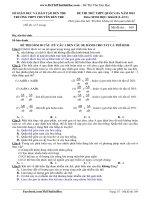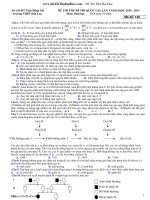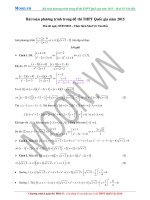DE THPT QG
Bạn đang xem bản rút gọn của tài liệu. Xem và tải ngay bản đầy đủ của tài liệu tại đây (61.6 KB, 6 trang )
<span class='text_page_counter'>(1)</span>ĐỀ LUYỆN THI THPT QUỐC GIA NĂM 2016 Môn: TIẾNG ANH – ĐỀ SỐ 01 Thời gian làm bài: 90 phút, không kể thời gian phát đề PHẦN TRẮC NGHIỆM: (8 điểm) Mark the letter A, B, C, or D on your answer sheet to indicate the word whose underlined part is pronounced differently from that of the rest in each of the following questions. Question 1. A. lean B. teammate C. beacon D. overhead Question 2. A. challenge B. snatch C. brochure D. chocolate Question 3. A. naked B. sacred C. learned D. studied Mark the letter A, B, C, or D on your answer sheet to indicate the word that differs from the other three in the position of the primary stress in each of the following questions. Question 4. A. description B. counselor C. inspector D. amendment Question 5. A. psychiatry B. inexpensive C. patriotic D. scientific Mark the letter A, B, C, or D on your answer sheet to indicate the word(s) CLOSEST in meaning to the underlined word(s) in each of the following questions. Question 6. You must answer the police’s questions truthfully; otherwise, you will get into trouble. A. in a harmful way B. as trustingly as you can C. with a negative attitude D. exactly as you can Question 7. It takes me 15 minutes to get ready. A. to prepare B. to wake up C. to go D. to get up Question 8. In rural Midwestern towns of the USA, the decisions that affect most residents are made at general assemblies in schools and churches. A. concerts B. public libraries C. gatherings D. prayer services Mark the letter A, B, C, or D on your answer sheet to indicate the word(s) OPPOSITE in meaning to the underlined word(s) in each of the following questions. Question 9. Polluted water and increased water temperatures have driven many species to the verge of extinction A. enriched B. contaminated C. purified D. strengthened Question 10. The story told by the teacher amused children in the class. A. astonished B. frightened C. jolted D. saddened Mark the letter A, B, C, or D on your answer sheet to indicate the underlined part that needs correction in each of the following questions. Question 11. It is vitally important that she takes this medication night and morning. A. vitally B. that C. takes D. medication Question 12. Had it not been for you help me, I wouldn't have succeeded. A. not B. you help me C. wouldn't D. succeeded Question 13. Children enjoy telling and listening to ghosts stories, especially on Halloween night. A. Halloween night B. ghosts stories C. especially D. telling and listening Question 14. We had better to review this chapter carefully because we will have some questions on it on our test tomorrow. A. to review B. carefully C. will D. some Question 15. She is a very generously old woman. She has given most of her wealth to a charity organization..
<span class='text_page_counter'>(2)</span> A. generously old. B. her wealth. C. a charity. D. has given. Mark the letter A, B, C, or D on your answer sheet to indicate the correct answer to each of the following questions. Question 16. By tomorrow, the car___________ by me. A. will have been bought B. will be bought C. was being bought D. was bought Question 17. “___________” is used to express disagreement. A. I couldn’t disagree with you anymore. B. That’s not a good idea. C. That’s the way I see it. D. That’s what I’m not thinking of. Question 18. The meeting has been put___________ to Friday as so many people have got the flu. A. up B. in C. out D. back Question 19. The activities of the international marketing researcher are frequently much broader than___________. A. the domestic marketer has B. the domestic marketer does C. those of the domestic marketer D. that which has the domestic marketer Question 20. I am wrong, ___________? A. aren't I B. are I C. are not I D. am I Question 21. - Andy: “John got married again.” - Bob: “Really? Who___________?” A. with B. at C. to D. about Question 22. The child was told to___________ for being rude to his uncle. A. excuse B. forgive C. apologize D. confess Question 23. - Mai: “Wow, I’ve never seen such a nice cell phone, Nam” - Nam: “________________” A. Oh, I don’t know. B. Thank you. I’m glad you like it. C. You’re welcome. D. I agree with you. Question 24. - Albert: “Are you interested in scuba diving?” - Barack: “A lot. Undersea life is___________.” A. fascinating B. fascinate C. fascinates D. fascinated Question 25. "___________ anyone ring while I’m away, please take a message." A. Will B. May C. Should D. Would Question 26. She had to pass all her exams, or___________ she would not have a holiday. A. instead B. else C. though D. therefore Question 27. The meeting has been brought_________ to Monday due to the seriousness of the situation. A. on B. out C. down D. forward Question 28. If you want your son to do better on his exams, I suggest he___________ harder. A. will study B. studies C. will study D. study Question 29. My uncle was___________ ill last summer; however, fortunately, he is now making a slow but steady recovery. A. seriously B. deeply C. fatally D. critically Question 30. The chief foods eaten in any country depend largely on_______ best in its climate and soil. A. what grows B. it grows C. does it grow D. what does it grow Question 31. She made a list of what to do___________ forget anything. A. in order to B. so that C. so as not to D. not to Question 32. - Andy: “Can I smoke in here?” - Bill: “I’d rather you___________.” A. don’t B. didn’t C. won’t D. can’t Question 33. The grape is the___________, juicy fruit of a woody vine..
<span class='text_page_counter'>(3)</span> A. smooth skin B. skinned is smooth C. smooth-skinned D. skin which is smooth Question 34. The___________ collar workers received a rise, but the workers on the shop-door were told they had to wait. A. blue B. black C. grey D. white Read the following passage and mark the letter A, B, C, or D on your answer sheet to indicate the correct answer to each of the questions. Before the mid-nineteenth century, people in the United States ate most foods only in season. Drying, smoking, and salting could preserve meat for a short time, but the availability of fresh meat, like that of fresh milk, was very limited; there was no way to prevent spoilage. But in 1810 a French inventor named Nicolas Appert developed the cooking – and sealing process of canning. And in the 1850’s an American named Gail Borden developed a means of condensing and preserving milk. Canned goods and condensed milk became more common during the 1860’s but supplies remained low because cans had to be made by hand. By 1880, however, inventors had fashioned stamping and soldering machines that mass produced cans from tinplate. Suddenly all kinds of food could be preserved and bought at all times of the year. Other trends and invention had also helped it possible for Americans to vary their daily diets. Growing urban populations created demand that encouraged fruit and vegetable farmers to raise more produce. Railroad refrigerator cars enabled growers and meat packers to ship perishables great distances and to preserve them for longer periods. Thus, by the 1890’s, northern city dwellers could enjoy southern and western strawberries, grapes, and tomatoes, previously available for a month at most, for up to six months of the year. In addition, increased use of iceboxes enabled families to store perishables. An easy means of producing ice commercially had been invented in the 1870’s, and by 1900 the nation had more than two thousand commercial ice plants, most of which made home deliveries. The icebox became a fixture in most homes and remained so until mechanized refrigerator replaced it in 1920’s and 1930’s. Almost everyone had a more diversified diet. Some people continued to eat mainly foods that were heavy in starches or carbohydrates, and not everyone could afford meat. Nevertheless, many families could take advantage of previously unavailable fruits, vegetables, and dairy products to achieve more varied fare. Question 35: Which of the following types of food preservation was NOT mentioned in the passage? A. Drying B. Canning C. Cold storage D. Chemical additive Question 36: What does the passage mainly discuss? A. Causes of food spoilage B. Commercial production of ice C. Inventions that led to changes in the American diet D. Population movements in the nineteenth century Question 37: The phrase “in season” in paragraph 1 refers to____________. A. a kind of weather B. a particular time of year C. an official schedule D. a method of flavoring food Question 38: The word “prevent” is closest in meaning to____________. A. estimate B. avoid C. correct D. confine Question 39: During the 1860’s, canned food products were____________. A. unavailable in rural areas B. shipped in refrigerator cars C. available in limited quantities D. a staple part of the American diet Question 40: It can be inferred that railroad refrigerator cars came into use____________. A. before 1860 B. before 1890 C. after 1900 D. after 1920.
<span class='text_page_counter'>(4)</span> Question 41: The word “them” in paragraph 2 refers to____________. A. refrigerator cars B. perishables C. growers D. distances Question 42: The word “fixture” is closest in meaning to____________. A. luxury item B. substance C. commonplace object D. mechanical device Question 43: The author implies that in 1920’s and 1930’s home deliveries of ice____________. A. decreased in number B. were on an irregular schedule C. increased in cost D. occurred only in the summer Question 44: The word “Nevertheless” is closest in meaning to___________. A. therefore B. because C. occasionally D. however Read the following passage and mark the letter A, B, C, or D on your answer sheet to choose the word or phrase that best fits each of the numbered blanks. Anyone who has gone on a skiing holiday at a ski (45)_________ of any size will be familiar with the old-aged problem-the eternal wait for ski lifts and cable cars. Well, there is an alternative. If you feel like something just a (46)_________ different why not try heli-skiing in Canada? Somewhere in the snowy (47)_________ of the Rocky Mountains the helicopter will deposit you and your group onto a slope of virgin snow that you have all to yourselves. It is all a (48)_________ cry from the busiest slopes of, say, Switzerland, France, and Italy. You are fifty miles from the nearest town and there is nothing remotely (49)_________ a ski lift, so you have to (50)_________ on legs, skis and the chopper. You might see the (51)_________ Mountain goat or grizzly bear, but there won't be (52)_________ of other skiers. There are one or two disadvantages. Your friendly helicopter pilot might just put you down in a five-metre snow (53)_________. And freezing weather might ground your helicopter and leave you (54)_________ in the wilderness. Question 45: A. spot Question 46: A. little Question 47: A. cover Question 48: A. different Question 49: A. resembling Question 50: A. count Question 51: A. occasional Question 52: A. bunches Question 53: A. dune Question 54: A. deserted. B. haunt B. few B. county B. strange B. appearing B. trust B. sometime B. hordes B. pile B. stranded. C. refuge C. big C. wastes C. far C. seeming C. rely C. Incidental C. throngs C. mound C. marooned. D. resort D. lot D. refuge D. long D. looking D. reckon D. irregular D. swarms D. drift D. aground. Read the following passage and blacken the letter A, B, C, or D on your answer sheet to indicate the correct answer to each of the following questions. Large animals that inhabit the desert have evolved a number of adaptations for reducing the effects of extreme heat. One adaptation is to be light in color, and to reflect rather than absorb the Sun’s rays. Desert mammals also depart from the normal mammalian practice of maintaining a constant body temperature. Instead of trying to keep down the body temperature deep inside the body, which would involve the expenditure of water and energy, desert mammals allow their temperatures to rise to what would normally be fever height, and temperatures as high as 46 degrees Celsius have been measured in Grant’s gazelles. The overheated body then cools down during the cold desert night, and indeed the temperature may fall unusually low by dawn, as low as 34 degrees Celsius in the camel. This is an.
<span class='text_page_counter'>(5)</span> advantage since the heat of the first few hours of daylight is absorbed in warming up the body, and an excessive buildup of heat does not begin until well into the day. Another strategy of large desert animals is to tolerate the loss of body water to a point that would be fatal for non-adapted animals. The camel can lose up to 30 percent of its body weight as water without harm to itself, whereas human beings die after losing only 12 to 13 percent of their body weight. An equally important adaptation is the ability to replenish this water loss at one drink. Desert animals can drink prodigious volumes in a short time, and camels have been known to imbibe over 100 liters in a few minutes. A very dehydrated person, on the other hand, cannot drink enough water to rehydrate at one session, because the human stomach is not sufficiently big and because a too rapid dilution of the body fluids causes death from water intoxication. The tolerance of water loss is of obvious advantage in the desert, as animals do not have to remain near a water hole but can obtain food from grazing sparse and far-flung pastures. Desert-adapted mammals have the further ability to feed normally when extremely dehydrated, it is a common experience in people that appetite is lost even under conditions of moderate thirst. Question 55: What is the main topic of the passage? A. Weather variations in the desert B. Adaptations of desert animals. C. Diseased of desert animals D. Human use of desert animals. Question 56: According to the passage, why is light coloring an advantage to large desert animals? A. It helps them hide from predators B. It does not absorb sunlight as much as dark colors C. It helps them see their young at night. D. It keeps them cool at night. Question 57: The word “maintaining” is closest in meaning to___________. A. measuring B. inheriting C. preserving D. delaying Question 58: The author uses of Grant’s gazelle as an example of___________. A. an animal with a low average temperature B. an animal that is not as well adapted as the camel C. a desert animal that can withstand high body temperatures D. a desert animal with a constant body temperature Question 59: When is the internal temperature of a large desert mammal lower? A. Just before sunrise B. In the middle of the day C. Just after sunset D. Just after drinking Question 60: The word “tolerate” is closest in meaning to___________. A. endure B. replace C. compensate D. reduce Question 61: What causes water intoxication? A. Drinking too much water very quickly B. Drinking polluted water C. Bacteria in water. D. Lack of water. Question 62: Why does the author mention humans in the second paragraph? A. To show how they use camels. B. To contrast them to desert mammals C. To give instructions about desert survival. D. To show how they have adapted to desert life. Question 63: The word “obtain” is closest in meaning to___________. A. digest B. carry C. save D. get Question 64: Which of the following is NOT mentioned as an adaptation of large desert animals? A. Variation in body temperatures B. Eating while dehydrated C. Drinking water quickly D. Being active at night.
<span class='text_page_counter'>(6)</span> PHẦN TỰ LUẬN: (2 điểm) I. Rewrite the following sentences in such a way that they mean almost the same as those printed before them. Question 1: We didn't have any holiday until last summer. → It was not __________________________________________________________________. Question 2: Taking photographs is one of Susan’s interests. → Susan is ____________________________________________________________________. Question 3: “I’m sorry I damaged your tape recorder, Mike,” said Bob. → Bob apologized ____________________________________________________________. Question 4: Mr. Smith knew little about the Internet, so he didn’t invest into any computer companies. → Had _______________________________________________________________________. Question 5: The students have discussed the pollution problems since last week → The pollution problems _______________________________________________. II. Paragraph writing: With around 140 words, write a paragraph to talk about the things children can learn from their parents at home. The following cues may help you: - Parents are children’s first teachers. - Parents know exactly what abilities their children have. - Children feel free to learn at home. ---------------------THE END-----------------------.
<span class='text_page_counter'>(7)</span>







